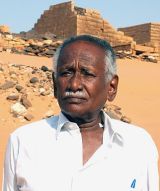Sudanese communist party, ruling NCP discuss democratic transition
December 19, 2007 (KHARTOUM) — A prominent member of the Sudanese communist Party (SCP) said that last week’s meeting with the ruling National Congress Party (NCP) was aimed at building national consensus among major political forces towards democratic transition in the country.

Khidir pointed out that the meeting between president Omer al-Bashir, Chairman of the ruling NCP and Mohamed Ibrahim Nugud, the SCP Secretary General, discussed the implementation of the Comprehensive Peace Agreement (CPA), Cairo agreement, and Eastern Sudan agreement.
The two parties also reiterated the need to put an end to the ongoing crisis in Darfur. He also said that the meeting tackled the upcoming 2009 elections and ways to build the best conditions for the success of the first general elections held in the country since 1989 coup d’etat.
The Central Committee member also said that his party expressed their dissatisfaction with the anti-constitutional practices of the security services with regard to the freedom of expression, ban on political meetings and peaceful demonstrations as well as monitoring of the political activities.
Khidir said that the two parties agreed to form a six-member committee to continue the dialogue and find ways to build on the outcomes of the meeting.
The party leader said that bilateral accords will not allow for the restoration of democratic rule as stipulated in the CPA. He further said that democratic forces are capable of assuming the task of creating a favorable atmosphere for transition into a pluralistic system.
The communist figure stressed that his party is not out to change the CPA or its decision making mechanisms.
“What we want is to do is to formulate consensual vision on the political situation in the country. After that the decisions are taken in accordance with CPA mechanisms in order to ensure the implementation of the CPA.”
Shafee disclosed that the two CPA partners, the NCP and the Sudan People Liberation Movement, expressed reservations on the proposal of national mechanism or a comprehensive conference because they fear that it will open the door for changes to the CPA.
He added that there is no problem with the text of Naivasha agreement but if there is a problem it is related to the implementation of the CPA.
“This is why we propose the national mechanism to discuss the implementation of the 2005 peace deal” he said
“We believe that the transitional period requires the participation of all the political forces because of the complexity of the political situation in the country.” he added.
He said that the SCP informed the other political forces – Democratic Unionist Patry, National Democratic Alliance, SPLM and Umma — of the outcome of the meeting.
Asked about the seriousness and the credibility of the ruling party, Shafee said that they consider this move as a serious one and they will deal with it as such.
“I do not believe that such a meeting will end the political isolation of the NCP. If they do not act positively and the joint committee fails to reach an agreement in this direction, the NCP would not escape the increasing isolation and we will maintain our initial position.” he concluded.
On the Darfur crisis, Shafee underscored that Darfur should be the priority of all Sudanese political forces because it should prelude any talk about general elections. He said parties should support a unified rebel position and that the rebel movements should be fully involved in the peace process and its procedural aspects in order to ensure successful peace talks.
The NCP has been conducting a series of high-level meetings with major political parties including the Umma party led by former Prime Minister Sadiq Al-Mahdi.
(ST)
